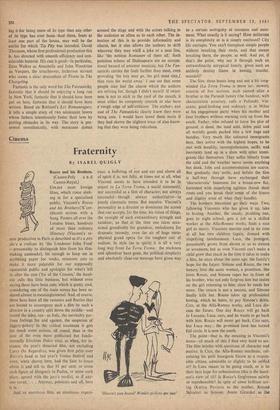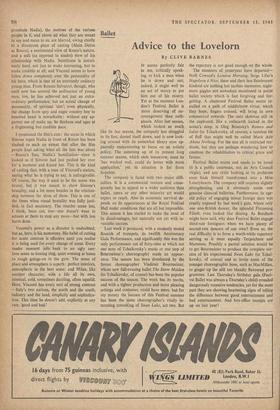Cinema
Fraternity
By ISABEL QU1GLY Rocco and his Brothers.
(Cameo-Poly a n d Cameo-Royal.) UNLIKE most foreign films, which come slink- ing in for a specialised public, Visconti's Rocco and his Brothers ('X' cer- tificate) arrives with a bang. Posters all over the London buses, handouts of more than ordinary illiteracy (Visconti's re- cent production in Paris is described as It's a pity she's a trollope by 'the Londoner John Ford' – presumably to distinguish him from his film- making namesake), fat enough to keep me in scribbling paper for weeks, extensive cuts to make it more palatable for our supposedly squeamish public and apologies for what's left in after the cuts ('Ire of the Censors,' the hand- out calls this little business, but without even saying there have been cuts; which is pretty cool, considering one of the main scenes has been re- duced almost to meaninglessness). And, of course, there have been all the rumours and flurries that are bound to accompany such a film by such a director in a country split down the middle—and round the sides, too—as Italy, the inevitably par- tisan feelings for and against, the suspicion of jiggery-pokery in the critical treatment it gets (so much more serious, all round, than in the case of the even more publicised but funda- mentally frivolous Doke vita), as when, for in- stance, the year's dreariest film, not excluding Carry On Regardless, was given first prize over Rocco's head at last year's Venice festival and even, when shown here, had the face to boast about it and tell us that 91 per cent. or some such figure of filmgoers in Padua, or some such place, agreed with the jury's verdict, as if any- one cared. . . . Anyway, polemics and all, here it is.
And an enormous film, an enormous experi- ence, a buffeting of eye and ear and above all of spirit it is; not fully, at times not at all, what Visconti seems to have intended it to be (a sequel to La Terra Trema, a social statement), nor successful as a film of character; nor always successful—though always authoritative—in purely cinematic terms. But massive. Visconti's personality as a director so dominates the screen that one accepts, for the time, his vision of things, the eyesight of such extraordinary strength and candour; so that at the time one takes occa- sional grandiosity for grandeur, melodrama for dramatic intensity, even the air of huge meta- physical grand opera for the toughest sort of realism. In style (as in spirit) it is all a very long way from La Terra Trema: the starkness and splendour have gone, the political simplicity and absolutely clear-cut message have given way 'Haven't you heard? Winkle-pickers are out.' to a certain ambiguity of intention and state- ment. What exactly is it saying? How deliberate is its complexity or is it simply confused? City life corrupts. You can't transplant simple people without breaking their roots, and that means breaking them, the people, as well. And yet, if that's the point, why say it through such an extraordinarily untypical family, given such an unlikely destiny (fame in boxing, murder, scandal)?
The film, three hours long and not a bit long- winded (La Terra Trona is more so: slower), consists of five sections, each named after a brother in the Parondi family (the handout, with characteristic accuracy, calls it Pafundll Vin- cenzo, good-looking and ordinary. is in Milan at his engagement party when his mother and four brothers without warning turn up from the south. Father, who refused to leave his plot of ground, is dead, the land sold, debts paid and all worldly goods packed into a few bags and bundles. Very much like coloured immigrants here, they arrive with the highest hopes, to be met with hostility, incomprehension, sniffs; and inevitably land up in a slum with other immi- grants like themselves. They suffer bitterly from the cold and the weather never seems anything but dank. Jobs and accommodation are scarce. But gradually they settle, and before the film is half-way through have exchanged their 'characteristic' basement for a brand-new flat, furnished with stupefying ugliness (break their roots and you break their sense of the fitness and dignity even of what they handle).
The brothers meantime go their ways. Two, following Vincenzo who has given it up, take to boxing. Another, the steady, plodding one, goes to night school, gets a job as a skilled worker at the Alfa-Romeo works, finds a nice girl to marry. Vincenzo marries and in no time at all has two children (again, dressed with stupefying tastelessness). Luca, the youngest, presumably grows from eleven or so to sixteen or seventeen, but as even Visconti can't make a child grow that much in the time it takes to make a film, he stays about the same age: the family's hope for the future. Simone and Rocco, the two boxers, love the same woman, a prostitute. She loves Rocco, and Simone rapes her in front of his brother, who not only forgives him but insists on the girl returning to him, since he needs her more. The return is not a success, and Simone finally kills her. Rocco takes up professional boxing, which he hates, to pay Simone's debts. Ciro, at the Alfa-Romeo works, and Luca dis- cuss the future. One day Rocco will go back to Lucania, Luca, says, and he wants to go back with him. Rocco will never get back, Ciro says, but Luca may: the promised land has turned full circle. It is now the south.
The point—that is, the meaning in Visconti's terms—of much of this I find very hard to see. The film bristles with questions of character and motive. Is Ciro, the Alfa-Romeo mechanic, cal- culating his petit bourgeois future as a respon- sible citizen, admirable or slightly to be sniffed at? Is Luca meant to be going south, or is he their best hope for urbanisation (this is the hand- out's view of it)? Is Rocco's forgiveness saintly or reprehensible? In spite of some brilliant act- ing (Katina Paxinou as the mother, Renato Salvatori as Simone, Annie Girardot as the prostitute Nadia), the motives of the various people in it, and above all what they are meant to say and mean to us, are blurred, owing chiefly to a disastrous piece of casting (Alain Delon as Rocco), a sentimental view of Rocco's nature, and a soft (as opposed to tender) view of his relationship with Nadia. Saintliness is notori- ously hard, not just to make interesting, but to make credible at all; and Visconti seems to have fallen down completely over the personality of his hero, which is that of an extremely ordinary young man. From Renato Salvatori, though, who until now has seemed the ordinariest of young men, too, he has achieved not just an extra- ordinary performance, but an actual change of personality, of spiritual 'size'; even physically, the change from spry and eager country boy to besotted beast is remarkable : without any ap- parent use of make up, he thickens and ages at a frightening but credible pace.
I mentioned the film's cuts: the scene in which Simone rapes Nadia in front of Rocco has been slashed to such an extent that after the film people kept asking what all the fuss was about —Rocco's fuss, Nadia's humiliation—since it looked as if Simone had just pushed her over for a moment and kissed her. This is the kind of cutting that, with a man of Visconti's stature, saying what he is trying to say, is unforgivable. Of course, the way it used to be the scene was brutal; but it was meant to show Simone's brutality, and a lot more besides in the relation- ship between the three of them. This is one of the times when visual brutality was fully justi- fied, in fact necessary. The murder scene has, I think, been cut, too—one doesn't want to scream at them to stop any more—but with less harm done.
Visconti's power as a director is undoubted; but so, here, is his monotony. His habit of cutting for acute contrast is effective until you realise it is being used for every change of scene. Every tender moment jolts back to an ugly one: love scene to boxing ring, quiet evening at home to tough goings-on in the gym. The sense of place and atmosphere is superb: perfect interiors, atmospheric in the best sense; and Milan, like another character, with a life all its own, inimical, cold, sometimes dazzling, often squalid. Here, Visconti has every sort of strong contrast —Italy's two nations, the north and the south, industry and the land, simplicity and sophistica- tion. This time he doesn't add, explicitly at any rate, 'good and bad.'



































 Previous page
Previous page